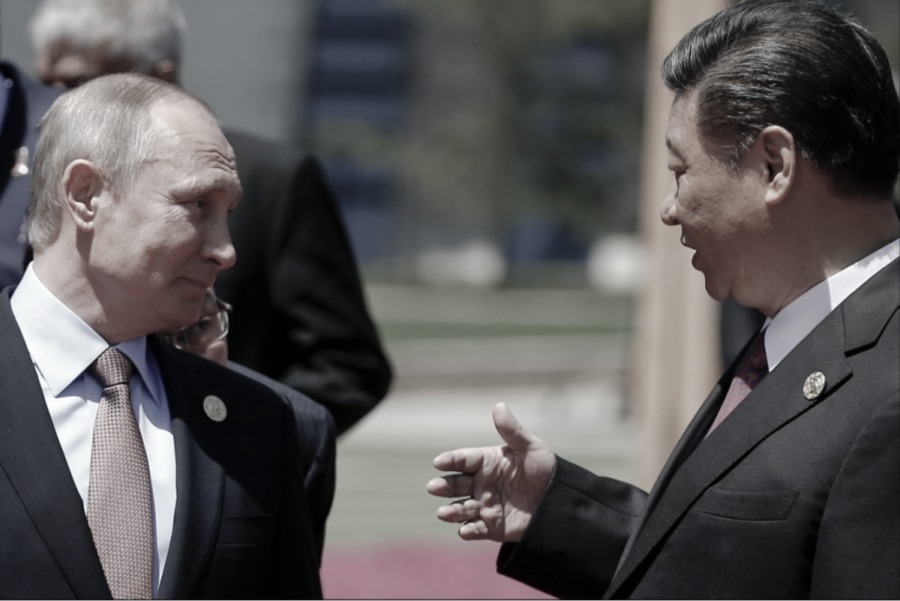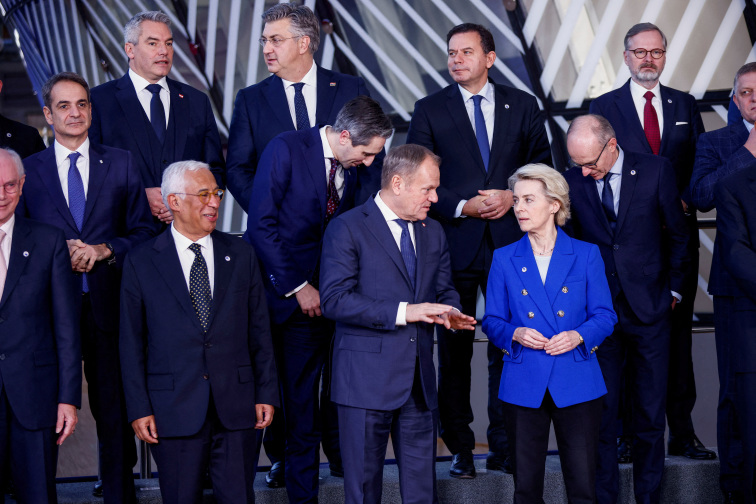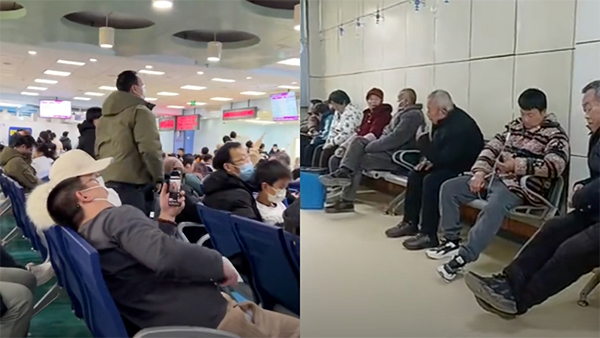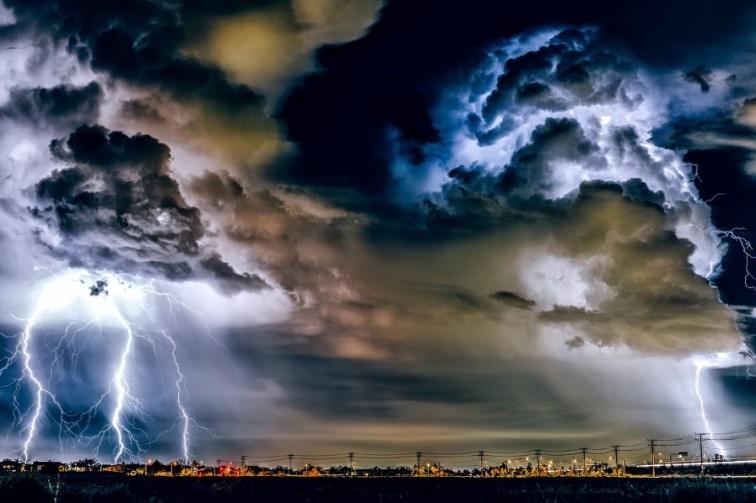File Photo: Putin and Xi Jinping Posing for a Photograph
[People News] Former U.S. President Donald Trump has made it clear that he wants to end the Russia-Ukraine war as soon as possible. He is simultaneously signaling to Moscow and hinting that Beijing could help since the Chinese Communist Party (CCP) is Moscow’s biggest supporter. Moscow is likely considering how to seize this rare opportunity to extricate itself, while Beijing may be calculating how to use this as leverage to ease Sino-U.S. relations. Both Beijing and Moscow, for their own interests, might be willing to "sell out" the other. Trump is working to drive a wedge between China and Russia, leaving it to Beijing and Moscow to decide who betrays whom first—or ideally, they betray each other.
Dividing China and Russia: A Key Trump Goal
Trump has criticized President Joe Biden's policies for pushing China and Russia closer together. Many in the U.S. political arena also fear that a China-Russia alliance poses a greater threat to the United States. Trump’s desire for a ceasefire in the Russia-Ukraine war is part of his strategy to split China and Russia, allowing the U.S. to focus its energy on confronting the CCP.
During the Cold War, the U.S. successfully pulled the CCP away from the Soviet Union to counter the communist bloc. Today, with the CCP as America’s greatest threat, Beijing and Moscow are mutually exploiting each other. To defeat the CCP, dividing China and Russia would be a strategic masterstroke.
If Moscow plans to continue the Russia-Ukraine war, it will require sustained support from the CCP; otherwise, it will struggle to sustain its efforts. However, if a ceasefire is achieved, Moscow’s dependence on Beijing would decrease significantly.
The CCP supports Moscow in the hopes that the Russia-Ukraine war will continue to tie down the U.S. and NATO, preventing them from focusing entirely on countering the CCP. If Trump succeeds in ending the war, the CCP’s calculations would fail. Should Trump craft a winning strategy against the CCP, ending the Russia-Ukraine war and dividing China and Russia would be essential first steps.
During his four years in office, Biden has implemented a strategy of "competition" against the CCP. National Security Advisor Jake Sullivan stated that the U.S.'s adversaries have been weakened—primarily referring to China, Russia, and Iran. Observers widely predict that Trump’s approach to the CCP would be more aggressive, on a larger scale, and, most critically, unconventional and unpredictable—making it harder for the rigid CCP to respond effectively.
The Biden administration has provided extensive aid to Ukraine, aiming to weaken Russia through a protracted war while sending a strong warning to the CCP: any adventurous war on its part would face a similar fate. The Russia-Ukraine war has revitalized NATO, strengthened U.S. leadership, and aligned European allies against the CCP due to Beijing's support for Moscow. Finland and Sweden, previously neutral, quickly joined NATO, marking another major outcome.
Over the past three years, Biden’s administration, together with NATO allies, has sustained Ukraine with large-scale military aid, forcing Moscow to pay an increasingly high price. The administration has refrained from actively promoting negotiations between Russia and Ukraine, leaving Moscow with little choice but to continue fighting. While there are differing views within U.S. political circles on Biden’s extensive military aid, he shows no intention of stopping before his term ends.
Trump has criticized Biden, including for failing to prevent the war from occurring. However, the current stalemate in the Russia-Ukraine war is not entirely a liability for Trump. With Russia significantly weakened, Trump can devote more attention to confronting the CCP and leverage the situation to divide China and Russia. Moscow, meanwhile, is anxiously awaiting signals from Trump about potential opportunities.
Moscow’s Motive to Betray the CCP
During the Cold War, the CCP turned toward the United States, betraying the Soviet Union and the communist bloc. After the CCP’s establishment, the Soviet Union provided significant aid to China. However, the inherently corrupt nature of communist regimes dictated an inevitable fallout between these two authoritarian powers. Out of fear, the CCP aligned itself with a common enemy—the United States. When Deng Xiaoping rose to power, he went as far as launching a war against Vietnam, the Soviet Union’s ally, to present his loyalty to the U.S.
Moscow has not forgotten the CCP’s history of betrayal, so it does not consider the CCP a reliable ally. Putin has repeatedly stated that he would not form an alliance with Beijing. Jiang Zemin’s concession of over 1 million square kilometers of territory to Russia allowed Moscow to reap an unintentional windfall, but it also likely reinforced Moscow’s understanding of the CCP’s nature. The CCP, willing to sell out its own land and people, is capable of betraying anyone.
Putin once remarked that you cannot choose your neighbors, which was a veiled jab at the CCP. After the collapse of the Soviet Union, Beijing poached various military experts, including aerospace specialists, and acquired an unfinished Ukrainian aircraft carrier along with its blueprints. The CCP reverse-engineered the Russian Su-27 fighter jet into the J-11 and modeled the J-16 on the imported Su-30, all while claiming these were indigenous developments. Similarly, the CCP copied Russia’s S-300 missile system and Kilo-class submarines. However, Moscow has never sold nuclear submarines to Beijing.
The Russia-Ukraine war has exposed the weaknesses of the Russian military. Now entering its fourth year without a decisive victory, the war has severely damaged Russia’s economy and national strength under relentless sanctions. Moscow cannot afford this prolonged conflict.
Moscow recognizes that the CCP is exploiting the conflict between Russia and NATO. In the absence of substantial foreign aid, Russia is forced to rely on dual-use goods supplied by the CCP. North Korea’s capabilities are limited—it may provide additional troops and ammunition to alleviate immediate shortages, but long-term supplies for the Russian military must come from Beijing.
What frustrates Moscow is that the CCP avoids openly and directly providing weapons and ammunition to the Russian military, instead maintaining a façade of neutrality in diplomacy. Beijing could turn Moscow into a bargaining chip at any time, trading it to the U.S. and its allies. Rather than being sold out by Beijing, Moscow may prefer the opportunity to betray Beijing first—a chance Trump is now offering.
Putin has long hinted that the CCP, despite claiming to be the world’s second-largest economy with rapidly expanding military power, is America’s real adversary. However, under Biden’s policies of simultaneous “competition” with the CCP and the draining of Russia’s resources, Moscow sees no way out other than to continue its costly offensive in Ukraine to build leverage for future negotiations. If Trump offers acceptable terms, Moscow would likely seize the opportunity for talks, ending the war’s endless drain and freeing itself from excessive dependence on the CCP.
Moscow understands that Trump intends to focus on confronting the CCP and hopes Russia will distance itself from Beijing. This would not significantly harm Moscow, as long as it can extricate itself from the Russia-Ukraine war in a relatively dignified manner. Should this scenario unfold, Moscow may opt to betray Beijing and cooperate with Trump. By inviting Xi Jinping to attend his inauguration, Trump is signaling Moscow while also offering the CCP an opportunity to betray Moscow first.
The CCP Needs to Act Quickly if It Wants to Betray Moscow
Faced with Trump’s invitation, it is highly unlikely that CCP leader Xi Jinping will visit the U.S. on January 20. Xi is unwilling to bow to Trump in person, especially when his authority within the party is precarious. A trip to Washington would not change the confrontational dynamics between China and the U.S., and attending Trump’s inauguration could only embarrass Xi and weaken his position. Beijing does not want to appear as though it is surrendering to the U.S., and with the current chaotic political situation in China, no one is willing to take the lead in signaling submission.
As Trump pushes to end the Russia-Ukraine war, Moscow has started raising the stakes in negotiations. The CCP cannot afford to remain idle, particularly if it wants to avoid being betrayed by Moscow first. Should the war in Ukraine come to an end, the U.S. and its allies, freed from distractions, would focus their attention on the CCP. If Beijing has an opportunity to sell out Moscow in exchange for a reprieve from Trump, it would likely take it. The key question, however, is whether the CCP can secure a firm commitment from Trump.
If the CCP halts the supply of military materials to Russia, Moscow’s war machine would falter—a result that both the U.S. and NATO would welcome. This could serve as a bargaining chip for Beijing, given its limited leverage in dealing with the U.S. However, if Moscow agrees to a ceasefire first, Beijing’s bargaining chip would lose its value. Therefore, if the CCP intends to sell out Moscow, it must act swiftly.
The CCP’s diplomatic system is clearly ineffective and unlikely to gain the trust of Trump’s team. Communication between the two sides has been strained, and the CCP leadership seems unable to grasp Trump’s true intentions. Reportedly, Trump’s team has requested direct communication with Cai Qi, bypassing the CCP’s foreign ministry. Cai Qi, who oversees the General Office of the Central Committee, represents a direct channel between the White House and Zhongnanhai, eliminating the need for the Ministry of Foreign Affairs as an intermediary—a move that could be highly embarrassing for Wang Yi.
This demand may also imply that Trump’s team expects a significant overhaul of the CCP’s diplomatic apparatus if Beijing wishes to continue engaging with the U.S. Otherwise, communication would have to occur directly at the highest levels. Zhongnanhai, accustomed to slower decision-making processes, might struggle to adapt to such direct communication. Trump’s team is likely exploiting the CCP’s internal disarray to probe who holds real power in Beijing and to assess the extent of Xi Jinping’s authority.
At this juncture, the CCP desperately needs Trump’s assurance that he will not seek to overthrow the regime. With the CCP barely holding on, even a slight misstep could lead to its collapse. The CCP’s greatest fear is a decisive strike from the U.S. at this vulnerable moment. Selling out Moscow to gain breathing room would likely be the most favorable deal Beijing could hope for. While Zhongnanhai might aim for more, a realistic assessment of its dwindling leverage would reveal otherwise. If the CCP continues to play the Taiwan card aggressively, it risks further backfiring.
Betraying Moscow is one of Beijing’s few remaining options. Should it fail to act quickly, it risks losing the opportunity and, worse yet, being betrayed by Moscow in return.
Beijing and Moscow May Betray Each Other
Trump's ideal scenario would likely be one where Beijing and Moscow betray each other.
If Moscow agrees to a ceasefire, it can temporarily escape the quagmire, avoiding further exploitation or betrayal by Beijing. Distancing itself from the CCP could also open the door to improved relations with the U.S., potentially leading to the easing of certain sanctions. The territory Russia has captured in Ukraine at great cost could then be framed domestically as a "victory."
Faced with the possibility of being sold out, Beijing might also move quickly to betray Moscow, perhaps attempting to position itself as a mediator. It could offer the appearance of brokering peace while covertly continuing to support the conflict, given its interest in prolonging the Russia-Ukraine war. However, if Moscow opts for a ceasefire and mends ties with the U.S., Beijing may be forced into a significant policy shift.
Trump has extended olive branches to Moscow while also sending signals to Beijing, aiming to foster mutual distrust and encourage reciprocal betrayal. If Moscow insists on high demands, Trump can simply continue Biden's military aid strategy. His criticism of Biden's approach to military aid primarily questions why the U.S. is bearing the lion's share of the financial burden for a war in Europe. Trump has raised the stakes for NATO allies, advocating for defense spending targets to rise from 2% of GDP to 5%. Should Europe contribute more to Ukraine's military support, the U.S. would also continue its aid, aligning with Trump’s vision of a fair alliance.
From Trump’s perspective, increased European military aid would likely involve purchasing U.S. weapons such as F-35 fighter jets and Patriot missile systems. European military support for Ukraine would also partially come from American suppliers, a prospect Trump would undoubtedly welcome. He similarly seeks to expand Europe's reliance on U.S. natural gas, cutting out Russian suppliers.
Trump could provide Ukraine with more advanced weaponry, potentially altering the war’s dynamics. This would weaken Moscow's negotiating position, forcing it to lower its demands and accept a ceasefire. Another significant concern for Moscow is whether NATO might exploit Russia's weakened state to deliver a decisive blow. This fear has prompted Russia to repeatedly brandish its nuclear arsenal. While a NATO offensive remains unlikely, Trump could leverage this fear in his negotiations.
Beijing is, of course, reluctant to be betrayed, but preemptively selling out Moscow could create a scenario where both sides end up undermining each other. Faced with Trump, the CCP has few effective cards to play, especially amid its internal turmoil. Trump has an arsenal of strategies against the CCP. For instance, tariffs are an easily deployable tool, with measures targeting fentanyl production already serving as a basis for potential tariff hikes. Beyond that, Trump could introduce further pressure points. Like Biden, Trump could simultaneously manage the Russia-Ukraine war while taking aim at the CCP. Meanwhile, Beijing's lack of clear strategy, compounded by internal chaos, may lead to repeated missteps, accelerating its path toward self-destruction.
(From Dajiyuan)










News magazine bootstrap themes!
I like this themes, fast loading and look profesional
Thank you Carlos!
You're welcome!
Please support me with give positive rating!
Yes Sure!